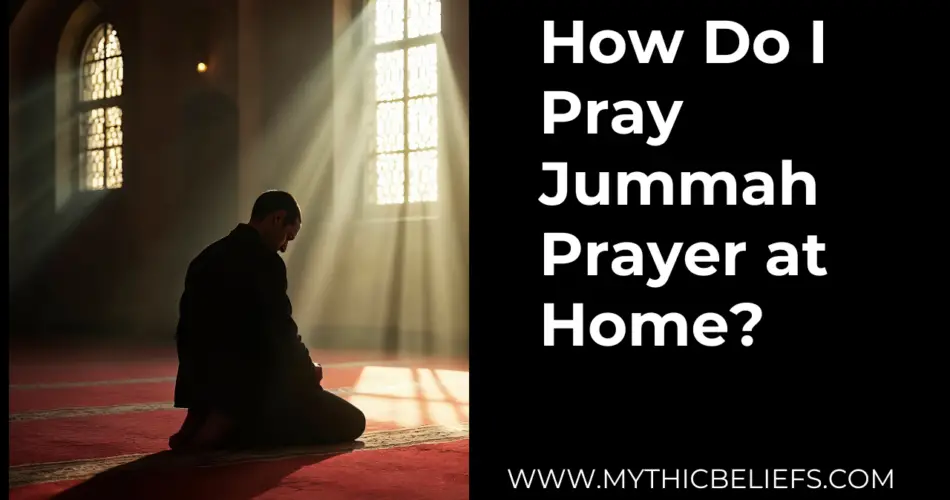There’s something uniquely peaceful about Fridays. That blessed day rolls around each week, carrying the weight of spiritual reset and community warmth. And for Muslims around the world, Jummah prayer—the Friday congregational prayer—is a powerful, soulful anchor to the week.
Now, let’s be real. Not all of us can make it to the mosque every Friday. Maybe you’re stuck in traffic, your city’s still reeling from health restrictions, or you’ve got toddlers climbing on your back like you’re a jungle gym (been there, done that). Whatever the reason, praying Jummah at home has become more common—and yes, it’s absolutely doable.
Grab a cup of chai or coffee, and let’s talk about how to perform Jummah prayer at home—in a way that feels real, personal, and just a little bit messy (because, well, life).
How Do I Pray Jummah Prayer at Home?
First things first, Jummah prayer is a special prayer that replaces the regular Dhuhr prayer on Fridays. Ideally, it’s prayed in congregation at a mosque, with a sermon (khutbah) before the prayer. But when that’s not possible—like during the pandemic or if you’re somewhere remote—it’s perfectly acceptable to pray at home under certain conditions.
If you’re praying Jummah at home, here’s the most straightforward way:
- You need at least 2 adult males (some scholars say 3, others say more, but two is widely accepted in many schools of thought).
- One person gives the khutbah (sermon)—don’t panic, it doesn’t need to be elaborate. Even reading a few verses from the Qur’an and a reminder about taqwa (being mindful of God) counts.
- Then, you pray 2 Rakats of Jummah in congregation, led by one person as the Imam.
And that’s it.
Of course, if you’re alone or don’t meet the basic requirement, you pray Dhuhr instead (4 Rakats)—no guilt, no stress. Allah knows your situation better than anyone.
How Many Rakats Are There in Jummah at Home?
Ah, the rakat confusion—it gets even the best of us.
Here’s the breakdown if you’re doing Jummah prayer at home with a valid congregation:
- 2 Rakats of Jummah (obligatory)
- 4 Sunnah before (optional but highly encouraged)
- 4 Sunnah after (again, recommended)
- Some also add 2 more Sunnah after that—but this depends on what school of thought you follow.
If you’re praying Dhuhr instead of Jummah (because you’re alone or can’t form a congregation), then it’s:
- 4 Rakats Dhuhr (obligatory)
- Plus Sunnahs if you’re up for them
Personally, I keep it simple. A small, focused prayer beats a long, distracted one. I usually do the Sunnahs before, the 2 Rakats of Jummah, then sit quietly for a bit—just me, my prayer mat, and that Friday stillness.
How to Pray Jummah If There Is No Mosque?
Let me tell you about that one Friday during the 2020 lockdown. The mosques were closed, and I remember standing in my living room, prayer rug angled just right, the kids arguing about who gets to pretend to be the Imam.
We ended up doing Jummah together—me, my brother, and my teenage nephew. I gave a short khutbah about gratitude (improvised and a bit shaky), and we prayed our two Rakats. Was it perfect? Not at all. But it was heartfelt—and that’s what matters.
If you’ve got no mosque nearby or can’t get to one:
- Try to gather at least one other adult male if possible.
- Choose a quiet spot at home.
- One person gives a short sermon—you can even read from your phone or a printed khutbah.
- Pray 2 Rakats together as Jummah.
And if you’re truly solo, no worries. Pray Dhuhr, and know that Allah sees your intention and effort.
Is Friday Prayer Only 2 Rakat?
Yes—the core of the Jummah prayer is just 2 Rakats, prayed in congregation. Think of it as a shortened version of Dhuhr with bonus spiritual benefits. But don’t forget the khutbah—it replaces the usual sermon and sets the tone.
Outside the obligatory part, there are Sunnah Rakats that many include, as mentioned earlier. But they’re not mandatory. So if life is chaotic (kids yelling, lunch boiling over, work emails buzzing), just make sure you pray the 2 Rakats Jummah properly with the sermon, and you’ve done your part.
Why Jummah at Home Is Becoming More Common
In today’s fast-paced, post-pandemic world, more people are seeking ways to stay spiritually grounded without always depending on traditional structures. Whether it’s remote work, living in non-Muslim countries, or health concerns, Jummah prayer at home has become a lifeline.
I’ve had friends livestream khutbahs to their small home groups, others who print sermons and take turns leading. It’s no longer just about rituals—it’s about connection. Making time for Allah, even in the middle of our messy, beautiful, unpredictable lives.
Final Thoughts: It’s About the Heart
Listen, you don’t need to have the perfect khutbah memorized or a five-star prayer room. You just need sincerity.
Jummah is a gift—a pause in the rush of life, a weekly spiritual tune-up. Whether you’re in a packed mosque or whispering verses in your living room while your toddler hugs your leg, what matters is your heart.
So don’t overthink it. Light some incense if that helps you focus. Wear your nice clothes. Set a little space apart for that sacred time. Invite a friend or sibling to pray with you if you can. And most importantly—show up for it, as best you can.
Let’s Keep the Conversation Going
Have you ever prayed Jummah at home? How did it feel for you? What worked—and what didn’t?
Drop your experiences in the comments. Let’s learn from each other, support each other, and keep the spirit of Jummah alive—wherever we are.
Peace and blessings,
Your friendly neighborhood blogger with a prayer mat and a coffee mug
